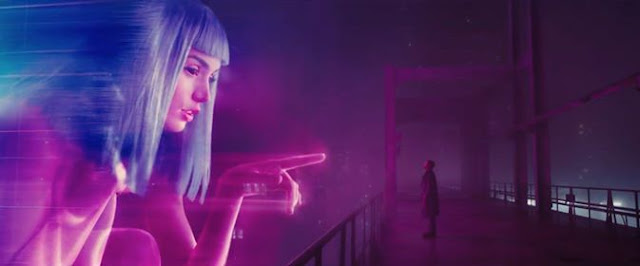Friday, October 6, 2017
film review: Blade Runner 2049
Director: Denis Villeneuve
Writers: Hampton Fancher (also story), Michael Green, based on a Philip K. Dick novel
Featuring: Ryan Gosling, Robin Wright, Ana de Armas, Sylvia Hoeks
ChinoKino score: A
Review by Allan Tong
When I heard there would be Blade Runner sequel, I groaned, fearing another Hollywood cash-grab of a classic film. Leave it alone. But when I heard that Quebec's Denis Villeneuve would direct, I contained my skepticism until I saw it. Well, I just saw the new Blade Runner.
Verdict: Mesmerizing.
2049 extends and completes the story of the 1982 original, resuming the storyline where the original film ends: Harrison Ford's Deckard escaping with experimental replicant Rachael (Sean Young). They're lovers in a dangerous time where blade runners like Deckard hunt down man-made replicants.
Villeneuve, DP Roger Deakins, production designer Dennis Gassner and the rest of his crew faithfully update Ridley Scott's vision of a dystopic Los Angeles in 2019. The L.A. of 2049 remains crowded, alienating, polluted and oppressively dark, though it's now radioactive and child slaves pick through computer parts in a factory. Like the original film, 2049's futuristic vistas are stunning and must be seen on the large screen.
Ryan Gosling plays the new blade runner, simply known as "K" while Ford reprises his role 30 years older and greyer. The story [spoiler alert] boils down to K reuniting Deckard with the child he and Rachel gave up many years ago to avoid capture by blade runners.
Beneath this storyline run questions about mortality that enriched the original Blade Runner: What is a human? Who is a soul? What the value of memory? Can a man-made machine have any or all these qualities? 2049 adds another level to the human/computer discourse by weaving in virtual reality through K's "digital" love interest, Joi (Ana de Armas).
2049 is also consistent with the original in tone--futuristic noir, lensed in rich oceans of shadow and darkness. Even the daytime scenes look like night. The pacing is meditative, never rushed. Action scenes avoid today's shallow videogame staccato tempo and instead advance the story. To further link to the 1982 film, characters Gaff (Edward James Olmos) and Rachel (Young) briefly reprise their roles, some with the aid of modern technology.
Though a worthy sequel, 2049 doesn't quite reach the heights of pathos like the original. I'm talking about Roy Batty's death where Rutger Hauer's final words brought tears to audiences alike in 1982. Also, 2049 falls short of portraying the likely racial make-up of L.A. in 2049. True, women like Robin Wright's character (K's boss) and villain Sylvia Hoeks dominate the cast, but there are few black, Latino, east Asian and south Asian faces here, all of whom populate the streets of L.A. today. I'm afraid this shortcoming will soon date Blade Runner 2049.
Shortcomings aside, Blade Runner 2049 is a worthy successor that honours and builds on the original film. It propels viewers into another world, both foreboding and hypnotic.
Subscribe to:
Post Comments (Atom)



No comments:
Post a Comment